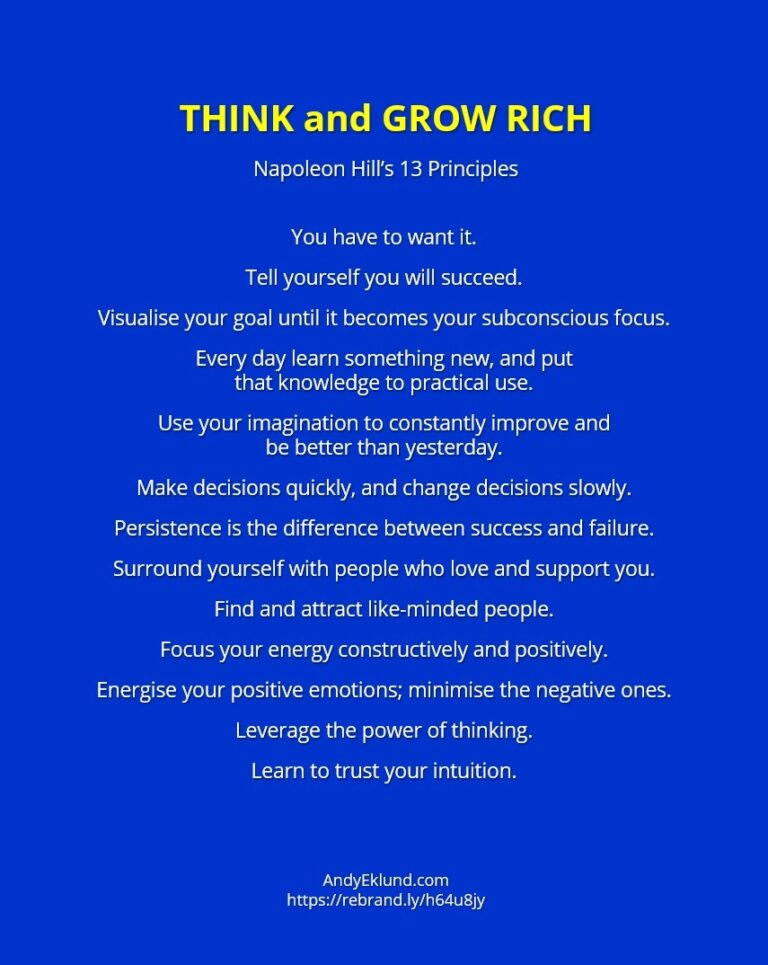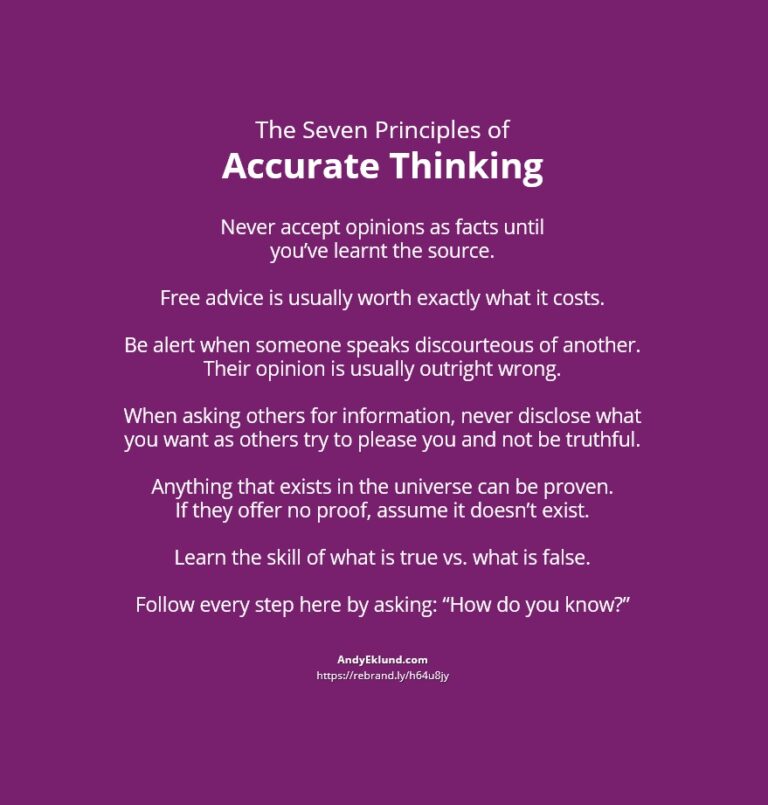Has anyone ever suggested you need to learn ‘accurate thinking’ but you had no idea what they were talking about?
Accurate thinking is a popular thinking method developed in the early 20th century by Napolean Hill, a highly controversial figure in his lifetime. However, his 1937 book Think and Grow Rich (co-written with his wife Rosa Lee Beeland) became a major commercial publishing success when it was released during the Great Depression. More impressive, it sold millions of copies worldwide when launched, and today is still one of the most popular books in the personal development field, if not helping to create the entire “self-help” publishing category.
Two side notes before I begin:
1) If you scratch beyond the surface of Hill’s online biographies, you’ll read how controversial and unethical he was. Several online sources refer to Hill as “the most famous conman you’ve probably never heard of.” However, don’t let his personal background get in the way of some potentially beneficial thoughts or, at least, discussions with your team members.
2) If you’re interested in purchasing the book, look for the updated version in 2007 which steers clear of some of Hill’s outdated references or opinions.
That said, it’s an interesting path toward accurate thinking, starting with three of Hill’s books – from Think & Grow Rich to The Keys to Success to The Science of Success, the final two produced well after Hill’s death in 1970.
It began with how to think to become wealthy
Following two poorly received books, Hill hit the jackpot with his third attempt: Think and Grow Rich.
Hard to believe now perhaps, but it was arguably the first book to advance the important idea that anyone can achieve success if they follow basic principles.
A novel idea at the time (excuse the pun), Hill compiled these principles from interviews with leading businessmen of his time, including Andrew Carnegie, Thomas Edison and Henry Ford.
Hill's core laws of 'thinking' to be successful
Depending upon which edition of the book you use (there are several), Think and Grow Rich laid out either 12 or 14 ‘laws’ to follow.
The first three principles are its key core elements …
- Desire – Having a burning ambition to achieve
- Faith – Having an unwavering faith in oneself
- Auto-Suggestion – Enlisting positive self-talk
… influence the remaining principles.
- Specialised Knowledge – Acquiring specific or niche knowledge: people don’t get wealthy based on general information
- Imagination – Visualising one’s goals
- Organised Planning – Creating a detailed plan to achieve one’s goal
- Decision-Making – Making a decision and not giving up (change the plan, never change the goal)
- Persistence – Moving forward, regardless of obstacles, toward your goal
- Power of the Master Mind – Surrounding oneself with like-minded people who support and encourage
- The Mystery of Sex Transmutation – Limiting, if not switching, from sexual desire to other more productive desires
- The Sub-Conscious Mind – Tapping into one’s subconscious mind
- The Brain – Using one’s brain to analyse and plan, making decisions, and taking action
- The Sixth Sense – Trusting one’s intuition and inner guidance
The final chapter in the book focuses on dealing with three enemies: Indecision, Doubt and Fear.
Given the book’s continued success at articulating these principles, you’ve very likely already read about some of these principles, from Rhonda Byrne’s The Secret to the Queen of Self-Help herself, Oprah Winfrey.
'Success' became more personal
Published in 1997 and edited by Matthew Sartwell, the next book – The Keys to Success – further expanded on Hill’s original thinking by outlining 17 principles of personal achievement to attain success.
These newer principles include the following:
- Definiteness of Purpose – articulating the precise purpose and plan; without it, one drifts without success
- Mastermind Alliance – cooperating with other like-minded people; no one is successful alone
- Applied Faith – facilitating a state of mind through which all success elements translate into reality
- Going the Extra Mile – doing more, offering something beyond what others can do
- Pleasing Personality – a sum of one’s mental, spiritual and physical traits, aka one’s “likeability”
- Personal Initiative – having courage and action to finish what one has started
- Positive Mental Attitude – success attracts more success
- Enthusiasm – radiating outwardly one’s desire and excitement
- Self-Discipline – mastering one’s thoughts, an ability to control one’s thoughts and needs, balancing head over heart
- Accurate Thinking – the positive power of thought
- Controlled Attention – essentially, a focus of the mind
- Teamwork – harmonious cooperation amongst a like-minded group of people
- Adversity and Defeat – failures merely represent a temporary delay toward one’s success; also, sometimes a defeat might be a blessing in disguise
- Creative Vision – free and fearless use of one’s creativity and imagination
- Health – being conscious of doing things which support and enable one’s health
- Budgeting time and money – both are precious resources to be used wisely
- Habits – developing positive, established habits, thoughts and deeds
Until he finally arrived at 'Accurate Thinking'
Finally, Hill refined his various philosophies into a style of thinking that focused people on how and what to think.
Focusing on the truth and facts, Hill sets up the point and purpose of accurate thinking in this quote from The Science of Success (2004, editor unknown.)
“The accurate thinker adopts a standard (of thinking) by which he guides himself …
… and he follows the standard at all times …
… whether it works always to his immediate advantage, or carries him (now and then) through the fields of disadvantage, as it undoubtedly will.”
Accurate thinking begins with two vital points. In order for one to think accurately …
- A person must separate facts from mere information, and
- They must separate facts into two classes: the important and the unimportant, or the relevant and the irrelevant. Facts that help move a person toward their goals are important and relevant. Those which do not are unimportant and irrelevant.
From those points of grounding emerge the seven points of Accurate Thinking.
- Never accept the opinions of other people as being factual until you’ve learnt the source of those opinions and satisfied yourself of their accuracy.
- Free advice requires close examination before acted upon as safe. Generally speaking, free advice is worth exactly what it costs.
- Alert yourself immediately if someone talks about another in a discourteous or slanderous spirit. This is biased at the very least, and very often may be outright wrong.
- When asking others for information, never disclose what you want the information to be. Most people have the bad habit of trying to please under such circumstances.
- Anything that exists in the universe can be proven. Where no such proof is available, it’s safer to assume nothing exists.
- Learn the mental skill of sensing what is true and what is false.
- Follow every step here by asking: “How do you know?”
Are these principles – collectively or independently – the key to wealth and success? I can’t answer that any more than I can tell anyone what to think. But, many reviewers of Hill’s philosophy agree that most people think their way through life without any system whatsoever. As I mentioned at the beginning, perhaps the best use of accurate thinking is to stimulate a conversation with team members or colleagues to decide how or when to apply the principles. And if all one did was think more thoroughly, then I’d assume Hill would consider that a positive first step.
If you’re interested in learning more about Hill, visit his foundation’s website.
Comments on Hill’s Accurate Thinking? Please add your thoughts and opinions below.




No comment yet, add your voice below!